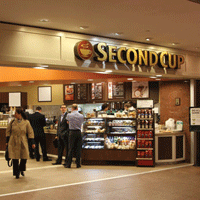It hasn’t been a banner year, but it has been fruitful. Although there was growth in the industry, it’s difficult to single out a specific segment that leads the pack. There are winners and losers in almost every category, but F&H’s Top 100 highlights top performers in the limited-service and full-service segment who rose to the challenges, while creating new opportunities for growth.
Evolution favours specialists
Within limited service, the specialists performed well. One of the fastest growers in 2012 was Toronto-based Smoke’s Poutinerie, whose unit count grew by 87 per cent to reach 43 from 23 units in 2011, with sales of $25 million (on the ‘Next 30’ list). The quick-service concept serves poutine in 20-some iterations as well as a create-your-own-option. Besides the classic Quebec comfort food, consumers are attracted to the irreverent attitude, retro rock music and opportunity to be a part of the scene — customers draw and leave messages on a chalkboard while they wait in line. Nearly five years old, the chain is expanding with the help of franchisees and innovative marketing that includes a food truck and a World Poutine Eating Championship.
Switching gears, Extreme Brandz made an impact in 2012, capitalizing on a growing trend toward Mexican nosh and healthful, fresh ingredients. The parent company of four brands, including Extreme Pita, Mucho Burrito, Purblendz and Via Cibo, introduced 30 units and increased sales by nearly 14 per cent to $111 million. Its breakout numbers include $71 million for Extreme Pita and $40 million for Mucho Burrito.
Meanwhile, Toronto’s Hero Certified Burgers made a big splash last year. Its gourmet heritage Angus beef burger, topped with gourmet ingredients, won many fans as 14 units were added to the system and sales increased by nearly 29 per cent to $31 million.
Another “better-burger” concept, The Works Gourmet Burger Bistro — a fast-casual chain with a family friendly setting — grew from 11 to 16 restaurants in 2012, landing on the ‘Next 30’ list with sales of $20.4 million. Last year, the executives announced their intention to open 50 stores across the country. The Ottawa-based chain represents an emerging fast-casual segment in Canada that has yet to be saturated by major U.S. players such as Chipotle, Panera Bread and Five Guys Burgers and Fries. The fast-casual concept is alluring to consumers, because it satisfies the niche between fast food and casual dining. These restaurants are perceived as offering fresher, higher-quality food in a more comfortable atmosphere than traditional quick-service chains, while also providing a lower price point than full-service restaurants.
But, among the other chains achieving double-digit sales growth are: Mary Brown’s Famous Chicken & Taters, the quick-service fried-chicken chain known for its large chicken portions and signature wedge-cut fried potatoes, saw sales rise by 17 per cent, for total sales of $70 million; Jimmy the Greek, headquartered in Toronto, whose 45 restaurants offer fresh, healthy and traditional Greek specialties, increased sales 12 per cent for total sales of $37 million; and Kingston, Ont.-based Pita Pit, a quick-service chain offering Lebanese-style pita sandwiches grew sales by 10 per cent, for total sales of $143 million.
Of course, menu specialists weren’t the only limited-service chains to experience healthy sales and unit growth in the past year. Segment leaders Tim Hortons (6.3 per cent), McDonald’s of Canada (5.6 per cent) and Subway (6.8 per cent) grew sales, too. Such growth came after continued coffee wars, especially between Tim Hortons and McDonald’s.
Broad is sometimes better
Likewise, within full-service, many of the concepts that earned significant increases in sales from 2011 to 2012 could hardly be called specialists. In fact, many of them pride themselves on offering broad menus to appeal to a variety of consumers. More specifically, much of the full-service segment growth can be attributed to the family dining concepts, which tend to be top-of-mind for breakfast, lunch and occasions that include young children.
One big winner is Sunset Grill, a California bistro-style eatery serving breakfast favourites for the morning and afternoon meals. Based in Mississauga, Ont., it has 95 units (up from 80 in 2011) and raised sales 60 per cent from $45 million to $72 million. Meanwhile, with sales growth of 21 per cent and total sales of $33.9 million, Chicken Chef, which is known for its pressure-cooked poultry, also offers a broad menu that includes ribs, pizza, hamburgers and seafood. The Winnipeg-based chain has a casual, homey atmosphere that appeals to a variety of consumers, but it primarily targets families. And, Ste. Therese, Que.-based Cora, known for its whimsical atmosphere and signature breakfast dishes, increased sales by eight per cent to realize total sales of $141.9 million in 2012.
While the family dining segment is growing, there are plenty of successes in casual-dining, too. The segment includes a variety of concept and menu positionings. Traditional casual-dining restaurants are well suited to dinners, late-night meals and social occasions that include friends and colleagues. Examples include growth chains such as the Pickle Barrel, a Markham, Ont.-based concept with a 300-plus-item menu served in a contemporary space with a prominent bar. It increased sales by 25 per cent for total sales of $75 million. At the same time, St. Louis Bar & Grill, the varied-menu, neighbourhood-focused concept, based in Toronto and known for its “devilishly good wings,” raised sales by 19 per cent to $47.8 million in 2012.
Consumers find the premium offerings, high-quality service and intimate atmosphere at more upscale venues especially appropriate for dates and special dinners with their spouse, partner or significant other. For example, Browns Socialhouse strives to offer the social elements of a neighbourhood pub while still creating an upscale yet casual experience. Based in Vancouver, Browns caters to a range of diners with everything from its signature bar-and-lounge area to its laid-back dining-room atmosphere. It increased sales by 13 per cent
for total sales of $33.5 million in 2012.
As the economy improves and consumer confidence rises, both midscale and casual-dining concepts will need to differentiate themselves from the competition within and outside of their sectors.
International opportunities
While competing in Canada, a growing number of chains are also looking beyond the borders for expansion. Booster Juice, the Edmonton-based quick-service smoothie-and-juice chain, signed a franchise deal to enter Brazil. Fulton Nogueira, the master franchisee, plans to commence development in Curitiba, which has a population of approximately 1.8-million people.
MTY Food Group Inc. opened its first location in the United Kingdom, a Thai Express in Guildford, Surrey, in July. The company also plans to develop two of its brands, Vanellis Fresh Italian Foods and Country Style, in Lebanon. And, its wholly owned subsidiary, MTY Tiki Ming Enterprises Inc., has signed two area master development agreements with a master franchisee to expand the brands into the country. That growth continues this year. In February, MTY Tiki Ming signed a master development agreement to open La Crémière in Saudi Arabia, while, Yogen Früz opened its first unit in Malaysia in May 2012 with the help of master licensee Timeless Commitment Sdn Bhd (TC); in November, the brand opened a unit in Lahore, Pakistan.
Closer to home, Second Cup opened a flagship Florida location in November in Pembroke Pines and announced it would open additional South Florida locations in the future. The Surrey, B.C.-based Wok Box Fresh Asian Kitchen opened its first U.S. location in Hillsboro, Ore., in September and another in Scottsdale, Ariz., this past January. The chain also announced plans to open additional units in Texas, Colorado, Oregon and Washington as well as in the Middle East throughout 2013.
Taking the non-traditional route
It’s worth noting that some chains have fought against competitive saturation by expanding within non-traditional locations. The trend is not new, but concepts are finding more interesting places to open businesses.
For example, Tim Hortons opened a non-traditional unit in Oxford House, a First Nations community in northern Manitoba. The community can only be accessed by plane, making the new location the chain’s first “fly-in” franchise. The restaurant will be supplied through regular flights from Winnipeg.
Meanwhile, Boston Pizza opened a unit at SAIT Polytechnic, the Southern Alberta Institute of Technology.
What’s more, Starbucks partnered with the Target Corpora-tion, which means Canadian Target locations will feature licensed Starbucks stores. Target is opening 125 to 135 locations across Canada this year, with a handful already open. Many of the new Starbucks stores will feature breakfast and lunch sandwiches, whole-bean coffee, Starbucks Via Ready Brew coffee and other merchandise as well as Starbucks’ signature customized beverages. It’s also opening units in Longo’s grocery stores.
Meanwhile, MTY Food Group Inc. opened its first food-court concept in Toronto, featuring six of its branded restaurants. Called 7 King Court, the food court is comprised of Mr. Sub, Country Style, Thai Express, Villa Madina, Tiki-Ming and Sushi Shop.
Future outlook
Canada’s foodservice reach is steadily growing; Technomic Inc. expects limited-service restaurants to increase a nominal 4.2 per cent in 2013, while the full-service segment is expected to grow by 3.9 per cent. With a projected sales growth for 2013, the short-term future of Canada’s foodservice industry looks bright.
Mary Chapman is director of Product Innovation at Technomic Inc., a Chicago-based research firm. She can be reached at [email protected].





















